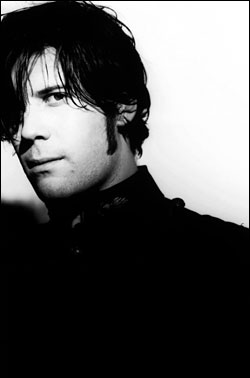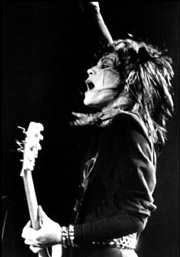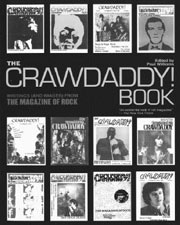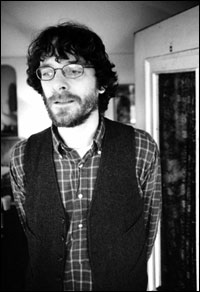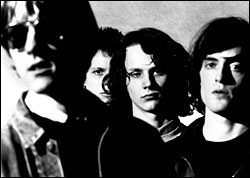Who are you, Ed Harcourt? Are you the brash, twentysomething songwriting prodigy whose full-length debut, 2001’s Here Be Monsters, invited comparisons to Brian Wilson, Harry Nilsson, Randy Newman, Tom Waits, and Badly Drawn Boy while earning a Mercury Prize nomination? Or are you the handsome U.K. upstart that Capitol marketed to the Flaming Lips/Radiohead/Jeff Buckley set when the record was finally issued stateside in ’02? Or are you the playful music fan with an obsessive’s grasp of rock trivia who, when interviewed by me last year, one moment ticked off a hipster’s worth of current faves (Lips, Outkast, Sparklehorse, Clouddead, Eels, Calexico), then the next gushed like a schoolgirl over having just seen Brian Wilson in concert?
The answer, most likely, is all of the above. As justified as the accolades were for Monsters, its eclecticism turned out to be both blessing and curse, for while critics adored its chameleon-pop features, in a post-Strokes world they’re now damning its follow-up for having similar qualities.
In 2002, Harcourt predicted his next record, a 20-song double album called The Ghost Parade, would be “a bit dense, a bit dark, balanced better but less polished.” Then he laughed nervously and admitted, “But I’m having post-recording depression: ‘Oh fuck, have I done the right songs? Is this going to be as good as it’s intended to be?'”
Indeed, the finished product wound up getting scaled back to a more manageable 12-song single disc. Retitled From Every Sphere, with the exception of a few songs bearing producer Tchad Blake’s unmistakable Los Lobos/Latin Playboys fingerprints, it’s hardly the dark/ dense/unpolished affair originally envisioned. It is a balanced effort, however, and it speaks volumes that a prolific, headstrong young musician would ultimately resist the urge to issue a sprawling magnum opus, just because he could, in favor of a keenly focused look at his core artistry.
Yet in the U.K., Sphere has gotten a decidedly mixed reaction. Both Mojo and Q awarded it a measly two stars, the former calling the results “patchy,” and the latter flatly stating that it “chokes on moments of indigestible excess.” Longtime Harcourt champion Uncut did name it their four-star album of the month for March, but the reviewer’s praise was guarded, suggesting the album was less immediate than its predecessor and more of a “grower.” Hardly the sort of press to make a programmer jump out of his seat.
The CD keeps me glued to mine, however. Following an overturelike introduction (the McCartney-esque lullaby “Bittersweetheart”), Harcourt delivers a barrelful of bipolar pop guaranteed to seduce your inner bruised romantic.
The gossamer-harmonied anthem “All of Your Days Will Be Blessed” is a fun-fun-fun slice of Brian Wilson, albeit one populated by fleeing, not flirting, lovers. Both the rumbling, distorted, effects-strewn “Ghostwriter” and the sinisterly, swaggering “Undertaker Strut” (listen for the avant-garde piano swipes and mariachi-flavored horns) serve, in their weirdness, to keep the listener off balance. Whereas a pair of tunes that fuse classic themes of love, sex, and death (the uplifting, Bacharachian “The Birds Will Sing for Us” and the weeping-strings, self-doubting ballad “Bleed a River Deep”) restore that balance by returning the listener to familiar singer-songwriter turf. And the luminous, orchestral “Metaphorically Yours” is gorgeous without being grandiose, traditional but not trite, as Harcourt, after rummaging through his lyric bag of tricks in hopes of winning back his lover through cleverness, finally says simply, “I confessI love you.”
A GROWER: Think of the onionlike quality that marks some of the best records by the icons name-checked in the first paragraph. The growing feeling of delight as new musical nuances and lyrical shadings unveil with each spin. The sense that this is an album to fall in love with in the company of a companion so that, years later, you can revisit it together like a book of snapshots: “Remember when we . . . ?”
From Every Sphere‘s most nakedly romantic moment comes with “Watching the Sun Come Up.” In it, a rich piano melody pulses and throbs, gradually building to a majestic crescendo as Harcourt, clearly awestruck by the bone- rattling intensity of a new love, sings how the sunrise “has beauty/That can never be silenced/It reminds me of you.” Yet at song’s end, he abandons all poetic pretense and is reduced to babbling: “Aww, come oncome on!”
In a sense, he’s pleading as much with you, the listener, as with the “you” in the song, and it reminds me of something he told me last year, about how all he really wants to do is touch people and make them feel something. Maybe that is what he’s all about, who he is.
Confessing that he couldn’t stop writing love songs if he tried, Harcourt sighed, then chuckled. “I guess I’m an old romantic, really, at heart.”
